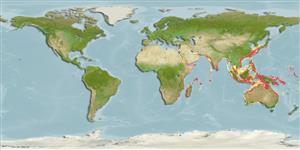>
Gobiiformes (Gobies) >
Gobiidae (Gobies) > Gobiinae
Etymology: Parachaeturichthys: Greek, para = the side of + Greek, chaite = hair + Greek, oura = tail + Greek, ichthys = fish (Ref. 45335).
More on author: Bleeker.
Environment: milieu / climate zone / depth range / distribution range
ນິເວດວິທະຍາ
ສັດທະເລ ອາໄສຢູ່ໃກ້ໜ້າດິນໃຕ້ພື້ນທ້ອງນ້ຳ. Tropical
Indo-West Pacific: south to Natal, South Africa; India (Ref. 4833) and Japan (Ref. 559).
ຂະໜາດ / ນ້ຳໜັກ / Age
Maturity: Lm ? range ? - ? cm
Max length : 15.0 cm TL ຕົວຜູ້/ບໍ່ມີເພດ; (Ref. 2798)
ຄີ (ໜາມ)ແຂງຢູ່ຫຼັງປາ (ທັງໝົດ): 7; ຄີຫຼັງຂອງປາ (ຄີອ່ອນ) (ທັງໝົດ): 9-11; ຄີ(ໜາມ) ແຂງຢູ່ຄີກົ້ນປາ
ກຸ່ມປາກະດູກແຂງ
ຄວາມຖີ່ຂອງກຸ່ມຖ່າຍທອດພັນ
ປາທີ່ມີການເຄື່ອນຍ້າຍຈາກທະເລໄປຫານ້ຳຈືດ ແລະນ້ຳຈືດຫາທະເລ
ປາທີ່ມີການເຄື່ອນຍ້າຍຈາກທະເລແລະໄປໄຂ່ຢູ່ນ້ຳຈືດ
ຄີກົ້ນຂອງປາ
ສັດທີ່ມີກະດູກສັນຫັຼງ
ການຖ່າຍທອດທາງກຳມະພັນຈາກພໍ່ແມ່ຫາລູກ 1; ຄີກົ້ນຂອງປາ: 9 - 10. Body greenish; fins dark; upper caudal fin base with a large black spot surrounded by yellow (Ref. 2798).
Parachaeturichthys spp. Inhabit deep water (Ref. 42915). Rarely enters estuaries (Ref. 4833). Captured by trawls over mud bottom (Ref. 11441). Found to contain tetrodotoxin (TTX) and anhydrotetrodotoxin (anh-TTX) which causes paralytic food poisoning (Ref. 54777).
Life cycle and mating behavior
ການຈະເລີນເຕັມໄວ | ການສືບພັນ | ການວາງໄຂ່ | ໄຂ່ | ຄວາມດົກຂອງໄຂ່ປາ | ຕົວອ່ອນ
Masuda, H., K. Amaoka, C. Araga, T. Uyeno and T. Yoshino, 1984. The fishes of the Japanese Archipelago. Vol. 1. Tokai University Press, Tokyo, Japan. 437 p. (text). (Ref. 559)
IUCN Red List Status (Ref. 130435)
Threat to humans
Poisonous to eat (Ref. 54777)
Human uses
ການປະມົງ: ທີ່ບໍ່ມີຄວາມສົນໃຈ
ຂໍ້ມູນຕື່ມອີກ
ຊື່ສາມັນຄຳສັບຄ້າຍຄືກັນການເຜົາໃໝ້ພະລັງງານໂດຍປ່ຽນທາດອາຫານໃນຮ່າງກາຍໃຫ້ກາຍເປັນຊີ້ນແລະໜັງຜູ້ລ້າການສຶກສາຜົນກະທົບຂອງສານຜິດທີ່ມີຜົນກະທົບຕໍ່ລະບົບນິເວດການສືບພັນການຈະເລີນເຕັມໄວການວາງໄຂ່ການສັງລວມການວາງໄຂ່ຄວາມດົກຂອງໄຂ່ປາໄຂ່Egg development
ເອກະສານອ້າງອີງການລ້ຽງສັດນ້ຳຂໍ້ມູນການລ້ຽງສັດນ້ຳສາຍພັນກຳມະພັນElectrophoresesການຖ່າຍທອດທາງກຳມະພັນຈາກພໍ່ແມ່ຫາລູກພະຍາດການປຸງແຕ່ງNutrientsMass conversion
ຜູ້ຮ່ວມມືຮູບStamps, Coins Misc.ສຽງຫອຍມີພິດຊະນິດນຶ່ງທີ່ອາໄສໃນທະເລຄວາມໄວປະເພດການລອຍເນື້ອທີ່ເຫືອກOtolithsສະໝອງວິໄສທັດ
ເຄື່ອງມື
Special reports
Download XML
ແຫຼ່ງອີນເຕີເນັດ
Estimates based on models
Preferred temperature (Ref.
123201): 22.4 - 28.1, mean 26.5 °C (based on 338 cells).
Phylogenetic diversity index (Ref.
82804): PD
50 = 0.7500 [Uniqueness, from 0.5 = low to 2.0 = high].
Bayesian length-weight: a=0.00891 (0.00530 - 0.01498), b=2.93 (2.78 - 3.08), in cm total length, based on LWR estimates for this species & (Sub)family-body (Ref.
93245).
ຊັ້ນເຂດຮ້ອນ (Ref.
69278): 3.1 ±0.3 se; based on diet studies.
ຄວາມຢືດຢຸ່ນ (Ref.
120179): ສູງ, ປະຊາກອນຕຳ່ສຸດທີ່ໃຊ້ເວລາສອງໜ້ອຍກວ່າ 15 ເດືອນ (Preliminary K or Fecundity.).
Fishing Vulnerability (Ref.
59153): Low vulnerability (10 of 100).
